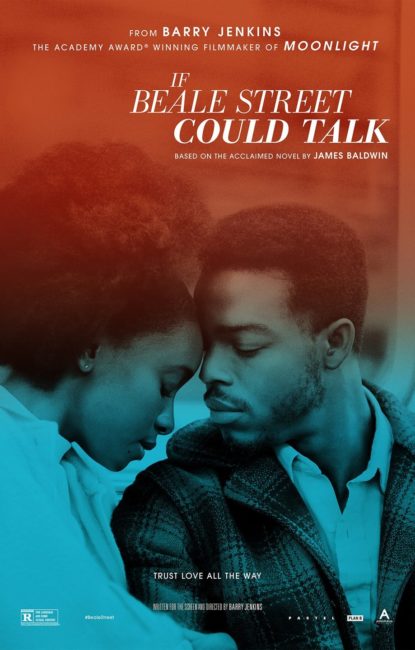← Back to Reviews
in
If Beale Street Could Talk
Director/writer screenwriter Barry Jenkins made Hollywood sit up and take notice when his 2016 film Moonlight won the 2016 Best Picture Oscar. Jenkins has proven that he is not a one-trick-pony, crafting another compelling drama called If Beale Street Could Talk that, like Moonlight, falls short of being the film it was meant to be, but offers rewards for the patient viewer who remembers the rewards our patience with Moonlight reaped.

Based on a novel by James Baldwin, it's 1970's Harlem where we meet Fonny and Tish. Fonny and Tish have been soulmates since they were children, they even used to bathe together. Fonny is now 22 and Tish is 19. As we meet them, Tish has just learned that she is pregnant with Fonny's child and that Fonny is in jail for rape. The drama layers out as we watch the couple's family simultaneously being torn apart by this bombshell and bonding together as they work together to get Fonny out of jail so that he can be with his family.

There are some football teams, off the top of my head, like the New Orleans Saints, who have been referred to as "second half teams"...they struggle during the first half and come alive during the second. I'm beginning to feel that Barry Jenkins is a second half director. Both this film and Moonlight start off a little slowly with the story moving at almost a deadening pace where interest begins to wane, and just when you're thinking about giving up or dozing off, Jenkins kicks the story into high gear for a powerhouse finish that leaves the viewer limp. That was how I saw Moonlight and reacted similarly to this often emotionally charged motion picture experience.

Like most director/screenwriters, I think Jenkins' direction is superior to his writing. He has a flawless ability for establishing a film's atmosphere. I mentioned earlier that the film was set in the 1970's and I know that not because it is printed at the bottom of the screen at some point, but because of Jenkins' attention to period detail...the look of the streets of Harlem in the 70's was on the money and if you don't believe me, check out films like Across 110th Street and tell me Jenkins doesn't nail it. There's also costumes, hair, selected dialogue (can't remember the last time in a movie I heard jail referred to as "the slammer), though sometimes I felt Tish' narration was, at times, overly sophisticated, it perfectly conveys the jumbled emotions of the character.

Jenkins also has a talent with the unexpected shock in a scene that the viewer never sees coming. There's a brilliant scene early on in the story where Tish' family invites Fonny's family over to the house to tell them about the pregnancy and Fonny's mother starts calling Tish every name in the book and we just know this woman is going to get slapped. The slap comes but it doesn't come from where we think and that's Jenkins directorial eye going into overdrive.

Jenkins has assembled a perfect cast for this story, not populated with a lot of stars, but actors who serve the characters and the story beautifully. Stephan James and KiKi Layne are lovely as Fonny and Tish and the amazing Regina King may finally get the Oscar she should have gotten for Jerry Maguire with her accustomed powerhouse performance as Tish' mother, who goes above and beyond duty to help her son-in-law. Her performance alone is reason enough enough to check this one out, but there's so much more going on here that, again, proves Barry Jenkins could become one of our greatest cinematic storytellers with a little more seasoning.
Director/writer screenwriter Barry Jenkins made Hollywood sit up and take notice when his 2016 film Moonlight won the 2016 Best Picture Oscar. Jenkins has proven that he is not a one-trick-pony, crafting another compelling drama called If Beale Street Could Talk that, like Moonlight, falls short of being the film it was meant to be, but offers rewards for the patient viewer who remembers the rewards our patience with Moonlight reaped.

Based on a novel by James Baldwin, it's 1970's Harlem where we meet Fonny and Tish. Fonny and Tish have been soulmates since they were children, they even used to bathe together. Fonny is now 22 and Tish is 19. As we meet them, Tish has just learned that she is pregnant with Fonny's child and that Fonny is in jail for rape. The drama layers out as we watch the couple's family simultaneously being torn apart by this bombshell and bonding together as they work together to get Fonny out of jail so that he can be with his family.

There are some football teams, off the top of my head, like the New Orleans Saints, who have been referred to as "second half teams"...they struggle during the first half and come alive during the second. I'm beginning to feel that Barry Jenkins is a second half director. Both this film and Moonlight start off a little slowly with the story moving at almost a deadening pace where interest begins to wane, and just when you're thinking about giving up or dozing off, Jenkins kicks the story into high gear for a powerhouse finish that leaves the viewer limp. That was how I saw Moonlight and reacted similarly to this often emotionally charged motion picture experience.
Like most director/screenwriters, I think Jenkins' direction is superior to his writing. He has a flawless ability for establishing a film's atmosphere. I mentioned earlier that the film was set in the 1970's and I know that not because it is printed at the bottom of the screen at some point, but because of Jenkins' attention to period detail...the look of the streets of Harlem in the 70's was on the money and if you don't believe me, check out films like Across 110th Street and tell me Jenkins doesn't nail it. There's also costumes, hair, selected dialogue (can't remember the last time in a movie I heard jail referred to as "the slammer), though sometimes I felt Tish' narration was, at times, overly sophisticated, it perfectly conveys the jumbled emotions of the character.

Jenkins also has a talent with the unexpected shock in a scene that the viewer never sees coming. There's a brilliant scene early on in the story where Tish' family invites Fonny's family over to the house to tell them about the pregnancy and Fonny's mother starts calling Tish every name in the book and we just know this woman is going to get slapped. The slap comes but it doesn't come from where we think and that's Jenkins directorial eye going into overdrive.

Jenkins has assembled a perfect cast for this story, not populated with a lot of stars, but actors who serve the characters and the story beautifully. Stephan James and KiKi Layne are lovely as Fonny and Tish and the amazing Regina King may finally get the Oscar she should have gotten for Jerry Maguire with her accustomed powerhouse performance as Tish' mother, who goes above and beyond duty to help her son-in-law. Her performance alone is reason enough enough to check this one out, but there's so much more going on here that, again, proves Barry Jenkins could become one of our greatest cinematic storytellers with a little more seasoning.
